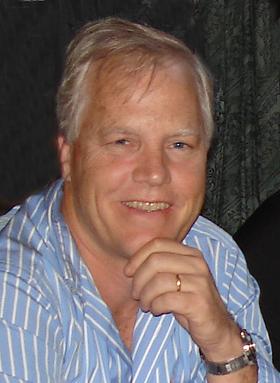|
Keating
became a regular at the major domain
conferences and his client steadily grew as
he proved himself to be among the very best
in the field - a status he retains today. He
has thoroughly enjoyed the journey but the
place where he is now, both professionally
and personally, is one he never would
have envisioned in the earlier stages of
a life filled with frequent moves
accompanied by unexpected twists and
turns (including a fateful day 15 years ago
that resulted in him spending the past
decade living overseas in Barcelona
and London).
|
In 1961,
when Paul was 11 years old, Ricky
Nelson's single "Travelin'
Man" hit #1 on the
Billboard Hot 100 Chart. It could have
been Keating's theme song because even
at that early age, he was already an
international traveler. Paul's dad was
an engineering graduate from Yale
who specialized in large maritime
construction projects including Chicago's
famous Navy Pier, the Chesapeake
Bay Bridge, the BART tube
in San Francisco and the Port
of Valdez in Alaska (his mother, a
Wellesley College economics
grad, is an active day trader who
raised a flock of five children, Paul
being the 2nd youngest among them).
As
children Paul recalled moving often as
his dad moved the family from one
major construction project to the
next. "After the Chesapeake Bay
Bridge project we moved to Jamaica
for five years. Then, when I was
11, dad started working for Peter
Kiewit and we moved to Omaha
for a year. By that Christmas my
father was in California
heading up the designs for the BART
tube construction, so we |

Paul
Keating's father worked on major
construction and renovation projects
at locations across the U.S. including
Chicago's iconic Navy Pier (above).
(Navy
Pier photo from Bigstock) |
|
moved to Novato,
a then small rural community about 45
minutes north of San Francisco.
It was so rural that I
delivered the local newspaper on my
horse!" |
When
he wasn't on horseback, odds are you would
see Keating in the swimming pool
through most his of his high school and
college years. "I was a competitive
swimmer and spent six hours a day in the
pool between the ages of 16 and 21,"
Keating said. "I swam with the likes of
Olympian Rick Dumont but my goals
were shut down by Jimmy Carter’s Olympic
boycott."
Aside
from swimming, the other think Keating
remembers about high school was his constant
debates with a social science teacher who
got so exasperated with their arguments
he told Paul he should go to law school - a
comment the verbally combative teenager took
to heart. Keating enrolled at the University
of San Francisco where he graduated in
1980, then stayed over to attend USF's law
school, earning his law degree in 1983.
|
As
an undergraduate, Keating studied business
& economics, fields that
helped him pick up a good part
time job. "During school worked
in the venture capital world
for what now are called PE (private
equity) firms. In the summer I worked heavy
construction because I financed my
own education," Keating said.
"I was also a DJ for the
university radio station (KUSF)
– which earned no money but it was
certainly fun and started my record
collection and my eclectic interest in
music. When I graduated from law
school and passed the Bar my finance
mentor sent me a card informing me I
was “Certified useless",
Keating laughed.
"I
started my legal career working for
the California Supreme Court.
After a short stint there I knew I
wanted no real part of litigation and
went to work for a small boutique IP
firm. I worked in startups, forming
Informix and other companies that
have since bit the dust but whose
technologies we rely on today (MP3s,
etc)."
His
time in the start up world left
Keating with an entrepreneurial streak
that has never gone away. "In
1985 I stopped practicing law
for three years to buy a clothing
factory in Peru |
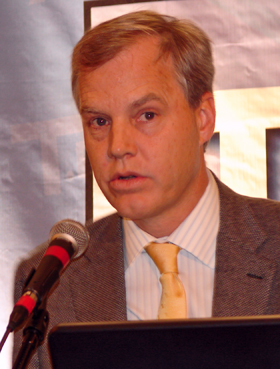
Paul
Keating speaking at the 2006
T.R.A.F.F.I.C. Silicon Valley
conference. |
|
but sold
it in 1989 because running a firm doing
the same thing every day grew
extremely boring. I went back
to work as a lawyer to service a
long-time client, then progressed
through various small to medium firms
and finally ended up as 1 of 13 equity
partners at Carroll, Burdick &
McDonough (CBM), a 97-attorney
firm where I ran the business practice
of 11 attorneys," Keating said. |
It
was at CBM, where Keating said he
specialized in strange clients, that
he was first introduced to domains in
1998. However, he did not warm up to
them right away. "I rejected a plan
from a senior associate to form a domain
practice because I did not believe it
could generate enough business",
Keating recalled. "However, among my
clients was one domainer who would end up
playing a large part in my life -
although I had no idea that would happen at
the time. My specialty was taxation and
difficult IP financing deals and I grew an
odd practice that included everything from
working for Jello Biafra and The Dead
Kennedys to designing equity
participation plans for law firms and
start-ups."
|
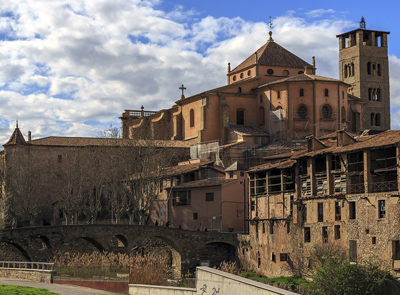
The
Romain Bridge Cathedral in Vic,
Spain - the
hometown of Paul Keating's wife
Victoria whose family
history there can be traced back
across nine centuries.
(Vic,
Spain photo from Bigstock) |
Keating's
relationship with domains wouldn't
really warm up until 2003 when he had
moved to Spain. How he wound up
there is another interesting story.
Remember the fateful day 15 years ago
that I mentioned earlier in this
article? Keating told us about it.
"In the summer of 1998 I met
my wife Victoria who was a lawyer
from Spain and who was in San
Francisco studying English and the
U.S. legal system. We lived in Tiburon
(a town in Marin County across the bay
from San Francisco) and spent our
vacations visiting her family in
Spain. Her parents lived in Vic
which is a small town in the Pyrenees
north of Barcelona where her
family has had roots for some 900
years. We spent Christmas in the
mountains in Vic in a house built
before the American Revolution
and |
|
summer at
the beach near the French border with
boat rides up the coast for lunch -
rather idyllic!," Keating
recalled fondly. |
"We
were married in 2002 in a small chapel in
Vic that was built in 1100. The wedding was
originally planned to for the fall of 2001
but was postponed due to 9/11. On
September 11th I was in Berlin giving
a presentation. I ended up flying to
Barcelona as all U.S. flights had been
cancelled. I spent a week holed up in
Barcelona until I could return to San Francisco.
We reset the wedding date because none of my
family and none of our friends from San
Francisco would travel. So, fast-forward to
spring of 2002 when everyone came to Spain
for the ceremony."
Another
twist of fate would end up making Keating a permanent
resident of Spain. By the end of 2002
Victoria was pregnant with their son Andreas,
but due to a medical issue she couldn't fly
back to San Francisco with Paul. So, he went
back to work for a couple of months then
returned to Spain for the birth in March
2003 and stayed until June, spending that
spring working San Francisco hours in
Barcelona - which meant working until 3am,
then picked back up with his family life at 10am.
After
Andreas was born, Keating still could
not get his family back to San Francisco.
"2003 was the year of SARS.
Andreas could not fly on a commercial
airline until he was 6 months old, so, I
returned in June and negotiated another
leave until September. We finally all
returned in September when I found my staff
had decorated my office with a skeleton and
cobwebs," Keating smiled.
|
Keating
also found that something bigger
than his office decor has changed.
"By then Spain had my heart,"
he said. "By December 20, 2003 I
had sold my interest in the
firm, sold my house, my car, etc. and
was standing in Barcelona
again. I had no idea what to do other
than not be an attorney. I had
plans to start other businesses and
had even negotiated a contract to
supply low-voltage security fencing to
the Catalan prison
system."
It
was then that Keating got that fateful
call from the old client in the domain
business - a call that has kept him
the domain industry ever since with
offices in both Barcelona and now London
as well. It is one of those rare
businesses that can provide the kind
of flexibility most an only
dream of. "Traditionally,
attorneys needed close proximity to
clients," Keating noted.
"There seemed to be a heavy
reliance on face-to-face
meetings. I have no such
restriction in my current
practice."
"Although
I started off with most clients being
based in the U.S., this has not been
the case for many years now. My
practice includes clients from far off
places such as Australia,
Philippines, Africa and Turkey
and not so far off places such as Europe.
I actually have never had a client
in Spain! London is unique for me
in that I actually have clients in England.
Since 2003 I have had five clients
visit my offices in Barcelona (counting
one that came twice!)," Keating
laughed. "I have had no
clients visit the London office.
Although time-zone issues arise
(particularly in London where we are
one hour earlier than Europe), I see
no real issues as to where clients are
located. We communicate largely
by email and phone." |
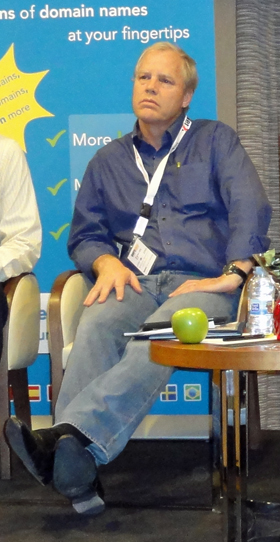
Paul
Keating speaking at the
2012
Domaining Spain conference in
Valencia. |
Keating
has been in the industry long enough to see
the dramatic changes the business has gone
through over the past decade. What was once
the equivalent of a mom and pop business
(actually even smaller in many cases with
just one "mom" or "pop"
involved) has grown into one that, despite
the recession, has minted a number onf new
millionaires.
"When
I first began seriously practicing in the
space, transactions were originally
completed with little or no
documentation and it was difficult to
convince clients that they should use even a
simple bill of sale," Keating
noted. "Now, however, it seems everyone
is a domain expert. I see the involvement of
more traditional business transaction
attorneys who are trying to impose
longer documentation with more onerous
clauses such as indemnification and much
more robust IP warranties. I recently
had to deal with an attorney who presented a
9-page bill of sale for a $1,250
transaction!"
"The
industry is consolidating and the
larger entities have begun to include domain
names into their marketing and IP issues.
With this growth has come more formality
and this will continue. I am currently
working on larger domain name financing
projects involving private equity firms
where the need for formalities is hugely
apparent. Governments in search of more
taxation revenues are also driving a
greater need for corporate formalities in
terms of revenue recognition and operational
regimes."
|
"On
the conflicts side, I see more
reliance on alternate dispute
resolution (ADR) and far less
litigation than in the 90s when the
likes of Verizon were obtaining
huge (but useless) judgments for
infringements," Keating said.
"This is good in some respects
(with faster, low-cost resolutions)
but raises serious issues for
registrants."
"The
ADR (UDRP/DRS)
process can actually preclude a
registrant’s litigation rights. The
domain environment (aside from ccTLDs)
is almost entirely based upon contract
– which is in essence a form of
private law. Here the lack of
formalities and foresight in the
contractual creation stage harms
registrants. Let me give you a
couple of examples:
First,
we all know a losing respondent has
the right to file formal litigation in
the mutual jurisdiction to preclude
the transfer of a domain in a UDRP.
However, many do not realize that the
mutual jurisdiction often does not
provide the respondent with a legal
right to press a claim. In other
words, |
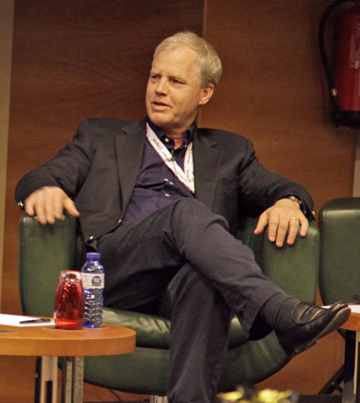
Paul
Keating on stage at the 2013
Domaining Spain conference in Valencia. |
|
the
protections in the UDRP are
meaningless and there is no
remedy. Similarly, in the UK,
the court in the Emirates
dispute ruled that the DRS constituted
binding arbitration thus
precluding post-DRS litigation. |
Second,
registration agreements are governed by the
law chosen by the registrar. Often
this is insignificant because the domain has
little value. However, this is not always
the case. I am currently involved in a
dispute over a valuable dot ME domain
where the registry improperly took back the
domain. The client has been forced to
file in Montenegro where there is no
developed law, where judges have little
to no experience in domain names and the
registry is effectively controlled by the
government. Litigation is further
complicated by the requirement of expert
opinions when all of the court-recognized
experts have conflicts due to their
involvement with the registry.
Aside
from contractual issues, domain registrants
are being increasingly under threat from
what I call the IP Rights Lobby and government
enforcement agencies (e.g. ICE),"
Keating added.
|
"I
fear that the industry has been
asleep and unorganized
while the IP rights lobbies have
undertaken a concerted effort to take
control of the discussion and policy
formation. Several examples come to
mind. The first example is the URS
where the rights of the registrant are
treated almost as an after-thought
with ever-expanding rights for the
claimant. Back-door changes have
suddenly appeared – such as the
newly proposed fee to be paid
by respondents. I believe we will see
the same claimants who play games with
UDRPs will migrate to the URS where the
lottery tickets are cheaper and
the burden is effectively shifted
to the respondent," Keating
predicted.
"A
second example is the changes to the Trademark
Clearing House (TMCH)
implementation. We have now run from
an exact match of a non-figurative
trademark to the ability to register
figurative marks as well as word
combinations of marks. As a
result I can now lay “claim” to
“fast cars” based upon a
figurative trademark consisting of a squiggly
doodle and the words “fast
cars”. There is even a
move afoot to allow registration based
upon the fact that a trademark has
been |

|
|
recognized
at the UDRP level even though the
threshold for establishing trademark
recognition at the UDRP level is so
low as to be largely non-existent,"
Keating said, adding, "These are
all part of the process of shifting
effort and cost away from the
trademark holders and placing additional
burdens upon the domain registrant
and associated domain name service
providers." |
With
so many threats to domain owner rights on
the horizon, how does one protect their
assets? Keating advised, "First, if you
are serious then treat your domain business seriously.
Spend time hiring an attorney. Most people
spend more time hiring a secretary
than they do in hiring an attorney. Look
at the track record. Find out what they
know about domains so that you do not
fund their education. Look for people who
will explain how you can do something and
not merely tell you why you can’t.
Recognize that not all attorneys are the
most efficient at all things. Negotiate
fixed prices for definable
projects."
|
"Second,
take a serious look at your domains
and at what you want to accomplish.
Factor legal fees in as an average
overhead cost issue (like your phone).
It is foolhardy to ignore legal
issues because the domain name at
issue is itself of low value. What is
needed is a structured |
|
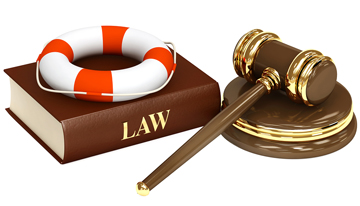
Legal
help image
from Bigstock |
approach
where you act as a team and the
attorney can teach you how to address
problems from the outset. For example,
after 6 months of working with an
attorney they should have taught you
enough so that you can handle most
claims properly. The same applies for
transactions; after 6 transactions you
should be familiar with basic terms so
that you can spot when you need help
and when you don’t."
"Third,
take care of your reputation.
If you don’t respond to cease &
desist letters or default in UDRPs you
will not be taken seriously when you
have a dispute you want to
challenge." |
"Finally,
if you have valuable domains, take care of
them. This means putting them in a safe
place with a registrar located in an agreeable
jurisdiction. For many of my clients, I
am advising that they use a U.S.
registrar for their good generics so that
(assuming they are using the domains
properly) they actually have the protections
of the ACPA
(the ability to challenge UDRPs,
etc.)," Keating said.
While
Keating keeps his finger on the pulse of the
domain industry, he is also juggling some
new balls in his personal life. "We
moved to London so my wife Victoria could
complete her Masters in Art History at Christies.
That meant that I became the principal
care-giver for our son Andreas (age
10). Andreas had never been formally
educated in English – he has long been
fluent speaking English (his third language)
but did not read or write fluently. So, lots
of tutoring and homework."
"Andreas
introduced me to Halo which we play
as a team. I have also gotten involved
in the atypical “dad” things such as PTA,
fund-raising for my son’s school,
arranging play dates, Museum tours and
attending football (European), rugby and
fencing matches. London is a great place
for kids. I have loved it although it
has meant less attention for my practice and
many questions from the other parents who never
seem to understand what I do or how I
can have such a flexible schedule,"
Keating smiled.
|
Aside
from being “dad” I have regained
my enjoyment for sailing.
Having grown up racing 1-designs in
windy San Francisco, I had found the
light breezes of Barcelona rather
boring. England has some interesting
sailing. We live on a golf course in
Spain and golf has always been an
off-and-on-again passion. Regrettably
I have yet to find any domainers in
England who want to play."
Before
signing off, we asked Keating if he
had any final advice for domain owners
and the service providers who depend
on them. Keating replied, "I
would like the domain community to get
more involved – and not just in
domain names and registrant rights
issues. The Internet was created with
such a sense of freedom and passion
– it allowed everyone to
participate. Now, however, we seen an ever
growing encroachment and I have a great
fear that this will stifle the
freedoms we have taken for granted."
"I
am not talking about the “freedom”
to have trademark typos or download
the latest ripped movie. My
concern is far more basic. The
Internet has become our lives
so to speak. I |
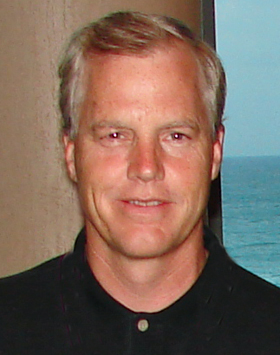
Paul
Keating at the 2006
T.R.A.F.F.I.C.
East conference in Florida
|
|
certainly
could not live my life without it. My
concern is over the degree of
control being exercised both by
government and large commercial
interests, largely in the name of law
enforcement, trade protection or, God
forbid, terrorism. I fear that given
the nature of the Internet and with
the ability to track where we are and
what we do, we will all end up being
far more controlled and that the
Internet, born out of a sense of
freedom will in fact become a prison
that we will have ourselves
constructed," Keating said. |
"This
is happening but it is occurring in small
steps. You can see some of it in the
comments above with respect to the
ever-expanding nature of IP rights. You can
see other steps in recent trade
agreement/treaty negotiations where
commercial interests are invited to
participate but the public is not.
You can see it in the calls for more CCTV
cameras and governmental investigations
into the email and phone logs of
journalists. You can see it in how the
government actively enforces civil IP rights
through domain name seizures (or
wholesale asset seizures such as with MegaUpload)."
"So
I encourage people to get more involved. Join
the EFF.
Join the ICA.
Participate in the likes of Kickstarter
to fund new business models for products,
publishing, etc. When you blog or post
comments do so thoughtfully. Read the U.S.
Constitution and realize that
there is a small minority of governments
that offer protections that are remotely
similar. Then realize that even the minority
of governments that do offer protections are
busy dismantling them when it comes
to the Internet," Keating
concluded.
|









